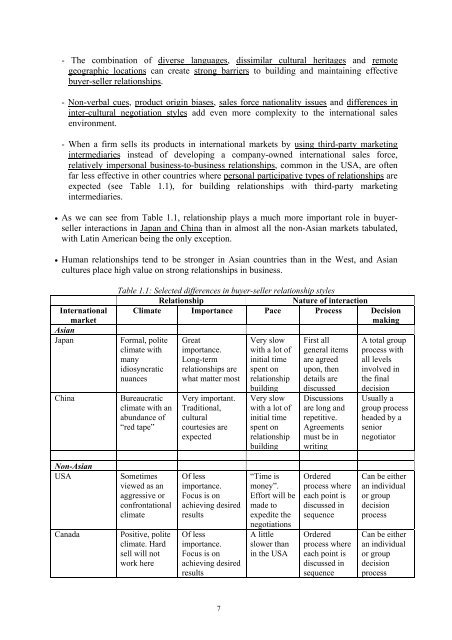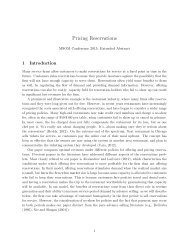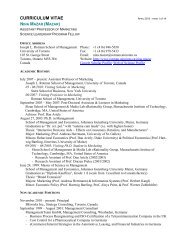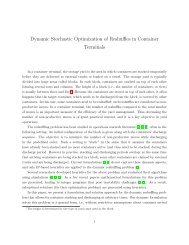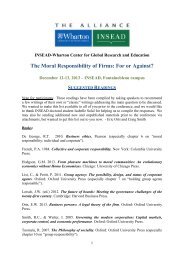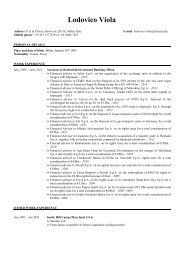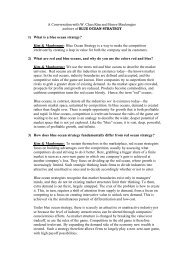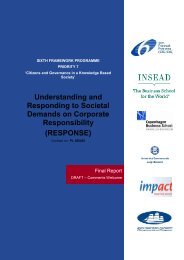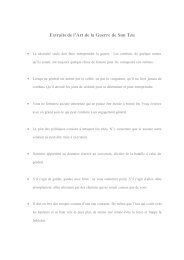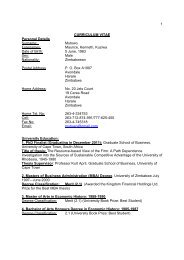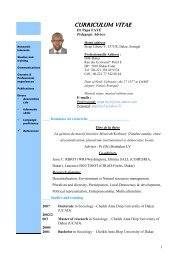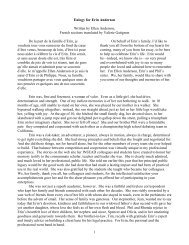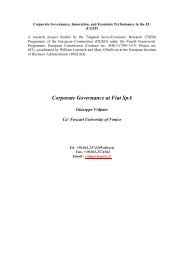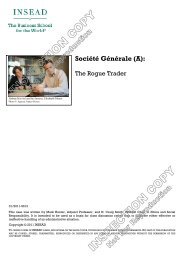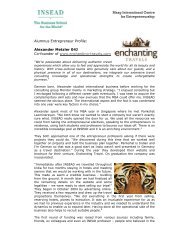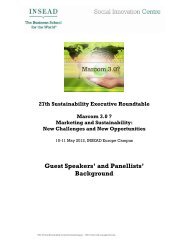Leading the Effective Sales Force: The Asian Sales Force ... - Insead
Leading the Effective Sales Force: The Asian Sales Force ... - Insead
Leading the Effective Sales Force: The Asian Sales Force ... - Insead
Create successful ePaper yourself
Turn your PDF publications into a flip-book with our unique Google optimized e-Paper software.
- <strong>The</strong> combination of diverse languages, dissimilar cultural heritages and remote<br />
geographic locations can create strong barriers to building and maintaining effective<br />
buyer-seller relationships.<br />
- Non-verbal cues, product origin biases, sales force nationality issues and differences in<br />
inter-cultural negotiation styles add even more complexity to <strong>the</strong> international sales<br />
environment.<br />
- When a firm sells its products in international markets by using third-party marketing<br />
intermediaries instead of developing a company-owned international sales force,<br />
relatively impersonal business-to-business relationships, common in <strong>the</strong> USA, are often<br />
far less effective in o<strong>the</strong>r countries where personal participative types of relationships are<br />
expected (see Table 1.1), for building relationships with third-party marketing<br />
intermediaries.<br />
• As we can see from Table 1.1, relationship plays a much more important role in buyerseller<br />
interactions in Japan and China than in almost all <strong>the</strong> non-<strong>Asian</strong> markets tabulated,<br />
with Latin American being <strong>the</strong> only exception.<br />
• Human relationships tend to be stronger in <strong>Asian</strong> countries than in <strong>the</strong> West, and <strong>Asian</strong><br />
cultures place high value on strong relationships in business.<br />
Table 1.1: Selected differences in buyer-seller relationship styles<br />
Relationship Nature of interaction<br />
International Climate Importance Pace Process Decision<br />
market<br />
<strong>Asian</strong><br />
making<br />
Japan Formal, polite Great<br />
Very slow First all A total group<br />
climate with importance. with a lot of general items process with<br />
many<br />
Long-term initial time are agreed all levels<br />
idiosyncratic relationships are spent on upon, <strong>the</strong>n involved in<br />
nuances what matter most relationship details are <strong>the</strong> final<br />
building discussed decision<br />
China Bureaucratic Very important. Very slow Discussions Usually a<br />
climate with an Traditional, with a lot of are long and group process<br />
abundance of cultural<br />
initial time repetitive. headed by a<br />
“red tape” courtesies are spent on Agreements senior<br />
expected relationship must be in negotiator<br />
building writing<br />
Non-<strong>Asian</strong><br />
USA Sometimes<br />
viewed as an<br />
aggressive or<br />
confrontational<br />
climate<br />
Canada Positive, polite<br />
climate. Hard<br />
sell will not<br />
work here<br />
Of less<br />
importance.<br />
Focus is on<br />
achieving desired<br />
results<br />
Of less<br />
importance.<br />
Focus is on<br />
achieving desired<br />
results<br />
7<br />
“Time is<br />
money”.<br />
Effort will be<br />
made to<br />
expedite <strong>the</strong><br />
negotiations<br />
A little<br />
slower than<br />
in <strong>the</strong> USA<br />
Ordered<br />
process where<br />
each point is<br />
discussed in<br />
sequence<br />
Ordered<br />
process where<br />
each point is<br />
discussed in<br />
sequence<br />
Can be ei<strong>the</strong>r<br />
an individual<br />
or group<br />
decision<br />
process<br />
Can be ei<strong>the</strong>r<br />
an individual<br />
or group<br />
decision<br />
process


